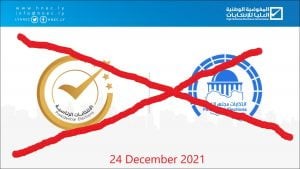By Sami Zaptia.

London, 27 December 2021:
In its report to parliament (HoR) on the postponed 24 December Libyan elections, the country’s High National Elections Commission (HNEC) reported several violations by the appeals committees in the presidential elections.
The report said that HNEC’s lawyers were denied access to some appeal hearings, as well reporting fraud and manipulations that marred the appeal procedures, which led to the reinstatement of candidates it had excluded because the conditions for candidacy did not apply to them.
In its report, to the House of Representatives (HoR) Election Committee, the HNEC made it clear that the committee’s provisions “did not comply with the provisions of the law, its content, purpose and purpose of setting the necessary restrictions and conditions” to accept applications for presidential candidacy, which led to the return of most of those it excluded.
HNEC added that the decisions to return some candidates came “despite the clarity of the reasons for their exclusion and the lack of application of the candidacy conditions to them, not to mention the cases of fraud that were proven by HNEC before the judiciary and were not considered.”
HNEC listed the cases of its objection to the judgments issued by the Appeals Committees, which are:
- The number of primary appeals in which litigation was not held reached 12 judgments, while the number of judgments in which litigation was held was only four.
- Five appeals were registered, and HNEC was not able to see the rulings and their reasons.
- All appellants did not pay the legally prescribed fees.
- The number of judgments issued in primary appeals against HNEC reached 11, while the number of judgments in primary appeals in favour of HNEC reached only seven.
- The judgments issued in the appeals against HNEC amounted to only 18 judgments.
- The total number of judgments that were not received by HNEC for review and preparation of appeal notes in their regard were 85 primary judgements and 20 appeal judgements.
- The number of final rulings reached 18.
HNEC added that the conflicting provisions and the failure to receive them successively led to conflicting information in the report, as some provisions did not reach HNEC for unknown reasons, noting the following observations:
1- Most of the rulings focused on looking in terms of form and neglected the subject, although the non-payment of the legally prescribed fees invalidates them all in terms of form, and thus most of the appeals lost credibility because they were not consistent with the text of the law and the and purpose of placing conditions on presidential election candidates.
2- The time limits set by the law regarding the submission of appeals, and their consideration by the competent judicial committees, were not adhered to, as many of the appeals were submitted and considered at the same time and date, which lost HNEC the opportunity to defend its decisions, in contravention of the text of Article (48).
3- In many of the appeals, HNEC was not announced, the litigation did not take place, and decisions and judgments were taken in absentia against HNEC’s decisions in violation of the text of Article (49), clause (5).
4- Preventing HNEC’s lawyer from pleading before the judicial committees in some appeals, due to the threat or fear of the consequences of their defence against one of the candidates.
5- Many judicial committees issued their rulings in terms of form and did not consider the issue, which resulted in the rulings not being compatible with the texts and conditions of candidacy and the law, and they produced rulings that violate the law.
6- The response of the case management was not at the level required to deal with such appeals, as it contributed intentionally or unintentionally and lost the rights of HNEC before the appeals committees.
7- Deception, manipulation, and deliberately setting the reasons later than the deadlines set for submitting the appeal, so that HNEC’s opportunities to see the reasons for the ruling and prepare the response for the purpose of appeal are lost.
Violations that cannot be relied upon.
HNEC considered that, based on what happened in the appeals stage, it “cannot be relied upon in HNEC’s announcement of the final list of candidates for the presidential elections, as this list will contain names who are not legally qualified to be on the list of candidacy for a direct election for the first president of the Libyan state since its independence.”
HNEC indicated that the stage of appeals began on 25 November, 2021 and ended on 7 December, and through which it became clear that the provisions issued did not comply with the provisions and content of the law and the purpose of setting the necessary restrictions and conditions for accepting applications for candidacy for the election of the head of state, which led to the return of the names of most who have been excluded.






